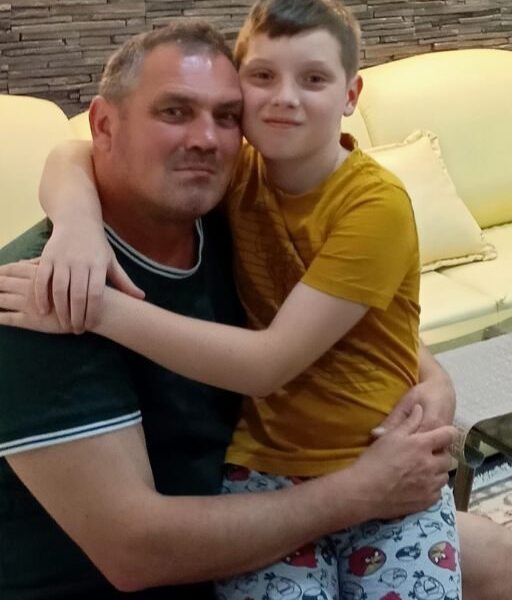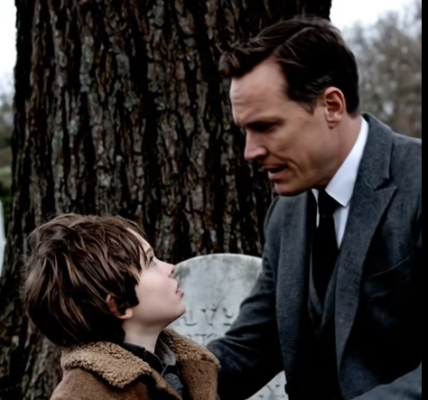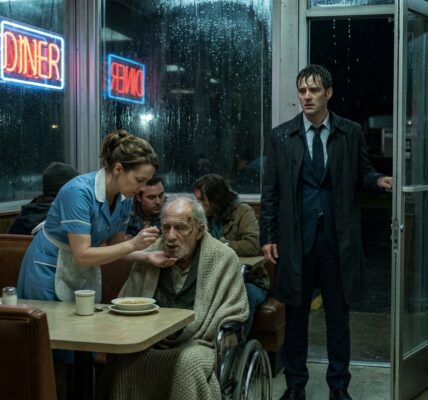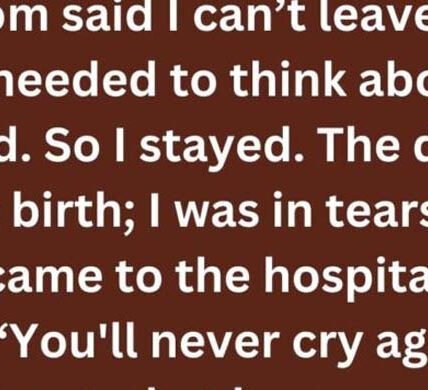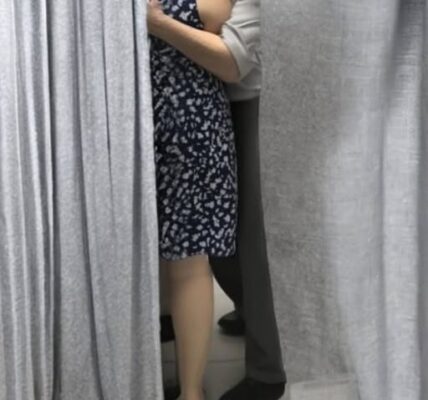I Lost My Son Five Years Ago—But Last Month, A Kid In Angry Birds Pajamas Changed Everything
After Matija died, I stopped sitting on the yellow couch
That was where we used to cuddle and play those ridiculous card games he made up. Where he wore those exact pajama pants with the Angry Birds on them—he practically lived in those things the year he turned eight.
The funeral ended, the house got quiet, and I just… shut off. Everyone grieved in their own way, but I didn’t want “a way.” I wanted my son.
Then last month, something strange happened.
I was visiting my cousin Renata in her village, helping her fix a broken tile wall. Her neighbor’s grandkid kept peeking into the yard. Same age Matija would’ve been now. Brown hair, cautious smile. Nothing unusual—until I looked down.
He was wearing those pants.
The exact same pattern. Same faded red birds. I froze.
Renata noticed. “Oh, that’s Arvid,” she said casually. “His family moved in after… well, you know.”
I didn’t know.
So I asked.
She said Arvid’s father had passed a year ago. His mom worked nights, barely home. Said the boy had grown up with her neighbor, Goran.
That night, I couldn’t sleep.
I kept thinking of the boy—how he’d looked at me like he recognized something. Or someone. And those pajamas. Matija’s were custom-made. My sister worked in textiles and had those sewn specially for his birthday. There weren’t any others like them.
I told myself it was just coincidence. Maybe the fabric got reused, donated somewhere. But the feeling didn’t go away.
The next morning, I walked past Goran’s house on purpose. Arvid was outside with a soccer ball, alone. He looked up at me, that same cautious smile.
“Hey,” I said. “Nice kick.”
He shrugged, kept dribbling. Then, almost shyly, he said, “You’re the man from yesterday.”
I nodded. “That’s me.”
He stopped the ball with his foot and tilted his head. “You look like my dream.”
That hit harder than I expected.
I knelt down. “Your dream?”
He looked around, like checking if someone was listening. “There’s this dream I get sometimes. I’m little. There’s a yellow couch. And a big man reads stories. There’s a card game with numbers that don’t matter.”
My throat tightened. That was Matija’s game. He called it “Shufflesnooze.” No rules, just make-believe logic and silly voices.
“Do you… play that game with anyone now?” I asked.
He shook his head. “I only remember it in dreams. But it feels real.”
I went home that afternoon, trying to push it away. But I couldn’t.
The next few days, I found excuses to walk by again. Arvid would wave or say something strange that made my heart thump. Once he said, “You smell like rain and popcorn,” which is exactly what Matija used to say after movie nights.
By the fourth day, I couldn’t take it anymore. I asked Renata if she could arrange for me to spend more time with Arvid—maybe help him with schoolwork, since I used to be a teacher.
Renata was cautious. “Goran’s a bit old-fashioned. Doesn’t trust strangers much.”
But she spoke to him.
To my surprise, Goran agreed—said Arvid could use a positive male role model. His mother barely had time for him, and the boy had become quiet lately.
So I started going over twice a week.
At first, it was just reading and math. Then it was board games. Then stories. Then “Shufflesnooze.” I taught it to him exactly the way Matija made it up.
He remembered every part.
“It’s like I already knew it,” he said once.
One afternoon, he showed me a drawing he made. It was a crude sketch—stick figures—but one was labeled “me,” and the other said “yellow couch guy.”
He’d drawn the exact yellow couch from my living room. Same cushions. Same rip on the side.
I didn’t know what to believe anymore.
I started dreaming again too. Dreams I hadn’t had in years. I saw Matija as he used to be, but older now, like how he’d look if he were still alive. In the dreams, he always smiled and said, “Don’t be afraid.”
One day, Arvid asked, “Did you lose someone?”
I froze. “Why do you ask?”
“Because I feel like I found someone. But maybe that means someone else is missing them.”
I wanted to tell him everything, but I didn’t. Not yet.
Instead, I asked Goran more about Arvid’s family. He told me the boy’s mom, Elma, worked long shifts at the hospital. His dad had been a mechanic, died in a road accident when Arvid was three.
“He doesn’t remember him much,” Goran said. “I’ve tried to be there, but I’m not good with kids.”
I could tell Goran cared, though. He wasn’t cold—just awkward.
Weeks passed. Arvid started calling me “Uncle” without being told to. I didn’t correct him.
He came over once to help me paint my fence, wearing those pajamas again. I couldn’t take my eyes off them.
That evening, while he was washing up, I checked the pants.
There it was.
Inside the waistband, faint but legible: “Matija 8.”
I sat down on the kitchen floor and cried harder than I had in five years.
The next day, I asked Elma if we could talk. She looked exhausted but agreed to coffee.
I told her everything.
About Matija. About the couch. About the pajamas. I showed her a photo of the pants when Matija wore them. I showed her the tag.
Her face changed.
She didn’t speak for a long time. Then she pulled out her phone and showed me an old photo.
It was Arvid, age four, holding the same pants. “These were a gift,” she said. “Someone left a box of clothes at our door. We’d just moved in with Goran. I assumed it was from the neighbors. I never knew where they came from.”
She paused. “I always thought Arvid got quiet because of his father’s death. But… maybe he was remembering something.”
I didn’t know what I expected from that conversation. Closure? Answers?
Instead, I felt something else: peace.
Maybe Matija had found a way to leave a part of himself behind. Maybe Arvid was just a boy who reminded me of my son.
Or maybe the two were connected in some strange, beautiful way I’d never understand.
After that day, things changed.
I invited Arvid and Elma over often. We made pizza, played “Shufflesnooze,” told stories. Goran softened, even joined in.
One evening, Arvid fell asleep on my yellow couch. I covered him with a blanket. As I sat next to him, I realized something.
I wasn’t replacing Matija. No one could.
But I was healing.
The yellow couch didn’t hurt anymore.
A few weeks later, Elma asked me something unexpected.
“Would you be okay being part of Arvid’s school file as his emergency contact?”
I stared at her. “Are you sure?”
“You’ve become important to him. And to me,” she said. “You don’t have to decide now.”
But I already had.
That night, I brought out a box I hadn’t touched in years. It held Matija’s drawings, toys, little notes he used to leave around the house.
I let Arvid go through it.
He pointed to a sketch Matija once made of the two of us. “That’s you,” he said. “And that’s me, right?”
I nodded.
A week later, something even stranger happened.
We went to a village fair. Arvid saw an old woman selling trinkets and ran over. He pointed to a small wooden horse.
“That’s it!” he said. “I remember this!”
I told him he couldn’t remember something he never had, but he insisted.
So I bought it.
When we got home, I pulled out another box.
Inside was the same wooden horse—Matija’s favorite. One of his last birthday gifts.
Now we had two.
I don’t know what that means. I don’t need to.
Sometimes, the heart knows what the mind can’t explain.
I still miss Matija every day. That will never change.
But Arvid gave me a second chance—not to be a father again, but to be present, open, and alive.
Love doesn’t always follow logic. Sometimes it finds us in the strangest ways.
A boy in Angry Birds pajamas changed everything.
So if you’re grieving… don’t shut the door completely.
Life has a way of sending echoes. Sometimes they show up with card games and cautious smiles. Sometimes, in pants with faded birds.
Keep your heart open.
You never know when someone needs it.
If this story touched you, please share it with someone who might need a little hope today.
And if you’ve ever felt something unexplainable—but beautiful—tell me in the comments. I’d love to read your story too.
